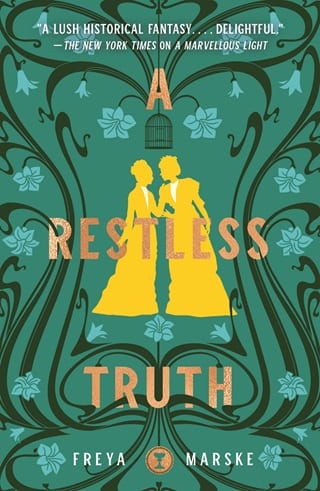Epilogue
EPILOGUE
“Sir Robert’s not home yet, Miss Maud,” said Mrs. Hathaway. “He’ll be sorry to have missed your arrival, I’m sure.”
Maud had been missing her brother with a pang that grew sharper and sharper as the train swallowed up the miles between Southampton and London, but she sagged in unexpected relief. She could do with some time on her own, settling back into being Miss Maud Blyth.
“He knows you’re expected—he’ll be in before dinnertime,” the housekeeper hastened to assure her, perhaps mistaking the softening of Maud’s shoulders for disappointment. “And he’s bringing Mr. Courcey as well.”
Maud stepped to the side of the narrow entrance hall to allow the footmen to pass with her luggage, carried up from the cab. “I’m so glad. I’ve been longing to see them both.”
“I’m sure they’ll want to hear all about America,” said Mrs. Hathaway, in tones that meant and so do the rest of us.
Maud laughed. “You know I won’t be able to stop talking once Robin is home. I’ll go and wash off the dust in the meantime.”
The Blyths had sold their family townhouse earlier that year. This new house was smaller, and Maud loved how empty of memory it was; how much easier it was to breathe in every space. Visitors assumed it was her touch on the decorating, but most of it had been Robin’s choices. The best of their parents’ art collection crowded walls that were cheerfully papered in the newest styles, among which their old sedate furniture sat like elderly patrons in a butterfly-house.
It felt like walking through Robin’s affection even when he was absent. Maud touched the corner of a picture-frame, straightening it against the red wallpaper with its pattern of honeysuckle and tulips.
She waved away the offer of help from one of the upstairs maids, then sponged down and changed out of her travelling-suit. Her lady’s maid, Teresa, had taken a temporary position at her aunt’s millinery shop, but Mrs. Hathaway would no doubt send word for her that very day. In the meantime, Maud could do for herself.
She paused for a moment with her fingers on the lace that edged her chemise, feeling her cheeks heat with memory.
Before they’d parted at the station, Maud had turned to Violet and said, Don’t let me ruin this.
She’d expected a flippant reply about how Violet had ruined herself first. But Violet had looked at her, eyes grey and steady as rainless clouds.
And said, You’re doing a good job, Maud. I’ll tell you when you aren’t.
Maud was putting the final touches to her dinner-dress when she heard voices downstairs. She flung down the bracelet she’d been failing to fasten around her wrist and went out into the upstairs hall to peer over the banister.
Robin and Edwin didn’t hear her footsteps, muffled as they were by the thick hall rug. Neither did they look up. Robin was talking animatedly about what appeared to be a boxing match as the footman accepted their hats and briefcases and carried them away, leaving the two of them alone.
Edwin picked up one of Robin’s hands as Robin talked, and examined the knuckles with a critical air. Then carried it to his lips for a brief, absent moment that made Robin’s voice trail off entirely. Robin took his hand back. He looked at Edwin as though this slim, unremarkable man was everything he could imagine wanting.
Wistful heat slid through Maud’s veins. She did want that sort of assured devotion, one day. And she wanted university. And adventure. And to set the world right, both magical and unmagical.
“Standing around like a lump instead of taking your guest into the sitting room, Sir Robert?” she called down. “Anyone would think you’d been badly brought up.”
Delight spread over Robin’s face. “Maud!”
Maud dashed down the stairs, tripped on the edge of the rug, righted herself, and flung herself into her brother’s arms. Something small inside her that had been tensed and afraid finally relaxed with the warmth of his grip and the familiar smell of his clothes.
She sent a beaming smile around Robin’s arm to Edwin, who returned it with a small one of his own. She’d have flung herself at him, too, but Edwin was fussier about when and how he was touched.
“Oh, it’s so good to see you both.” She squeezed Robin, then released him.
“Your telegram from Southampton was singularly uninformative,” said Edwin. “Robin had to go and exercise his nerves on an unfortunate viscount’s face.”
“Maudie, what happened?” said Robin. “Tell us everything.”
Everything. Maud bit her lip. What was she supposed to say?
She was now the supposed mistress of the Baron Hawthorn, a shameless trollop, and still half-suspected of being a jewel thief.
She’d recruited three people to the cause. She’d had a chance at an inheritance, and lost it, and might have been offered part of another. She’d learned to say fuck, and to perform the verb; and to have it performed upon her, thoroughly, by a music-hall magician with a hundred smiles and one high-walled heart.
She could speak in the voices of the dead, and had only a fraction of an understanding of what that meant. She was the same Maud Blyth and yet she was someone different: more knowing, more cautious. More aware of her power.
She’d failed, and failed, and succeeded. She’d brought them the cup of the Last Contract and knew where the knife was likely to be, even if their enemies knew it as well.
One on each side, and one to find, and a battle of some sort ahead.
“It is rather a lot to tell,” she said. “But I suppose I should start with the parrot.”
 Fullepub
Fullepub 



